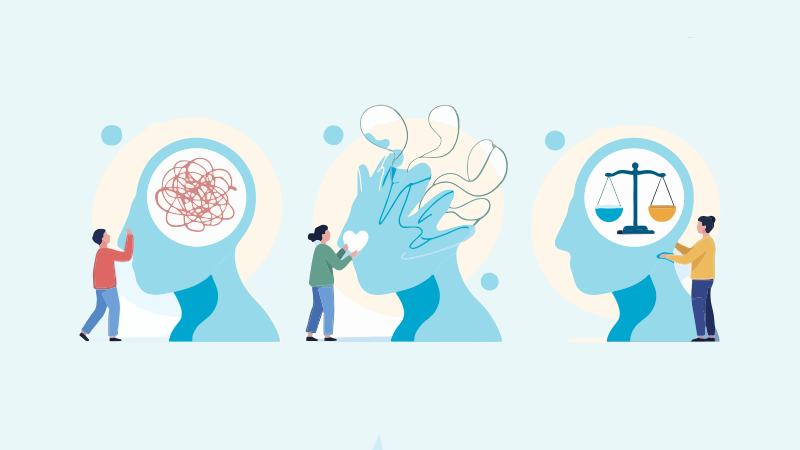
“The expectation that we can be immersed in suffering and loss daily and not be touched by it is as unrealistic as expecting to be able to walk through water without getting wet.” – Rachel Naomi Remen, MD
Plaintiff law firms are in the business of justice and people. Behind every case file lies a pain, trauma, and loss story. Because of this, attorneys, paralegals, and support staff don't just carry workloads – they also carry emotional loads. Teams suffer quietly and unnecessarily when helping professionals aren't taught how to carry that weight.
In the behavioral health and addiction recovery world we call this suffering ”empathy-related injuries.” These invisible wounds accumulate when professionals care deeply and constantly for others without replenishing themselves or receiving the proper support. In plaintiff firms, these injuries are common, but not inevitable.
Empathy-related injuries happen when a person's empathetic engagement with others becomes emotionally depleting, especially in high-stakes, high-emotion environments. I think of them as injuries of the heart and mind that invisibly stack one on top of the other until, eventually, a person cannot function as they once did before the injury.
Symptoms of empathy-related injuries include:
These injuries are labeled compassion fatigue, moral injury, burnout, or secondary trauma. While they are all empathy-related injuries, they have different causes and long-term effects for the individuals or teams affected by them.
Plaintiff firms are emotional workplaces. Clients bring their related grief, fear, and trauma to your firm. They seek help, support, and reassurance, which means that staff members are exposed to:
When you combine what clients bring with long hours, high expectations, workplace cultures that promote emotional detachment and performance over vulnerability and self-care, the conditions exist for a perfect storm that results in empathy injuries.
Law firm leaders aren’t expected to be therapists. They are expected to lead, manage, and shape the environment in which their team works. If you are a leader, there are some things you can do to encourage resilience and reduce the cost of caring.
Leaders set the tone. If discussing how cases affect your team emotionally is taboo, those emotions don't go away. They go underground and they come out sideways. Create space in team meetings, supervision, or check-ins to discuss the work's emotional side. Not performatively, but intentionally.
Quick Win: Start by naming it. “That was a tough case. How’s everyone doing after reading that file?” goes a long way.
In recovery, we've seen how peer support can transform burnout into resilience. Consider pairing new team members with experienced colleagues for debriefs on tasks and impact. Integrating peer mentorship or "decompression" circles can reduce isolation and build camaraderie.
Want to Learn More: Look into the resources of SAMHSA’s BRSS TACS, especially the reflective supervision practices in trauma-informed systems.
Many attorneys are naturally empathetic. However, few receive training to manage that gift. Teach your team the difference between empathy (I feel with you) and over-identification (I become consumed by you). Introduce models like the Window of Tolerance or Polyvagal Theory to help your team understand how stress and trauma show up in the body and workplace.
Recommended Resource: Anchored: How to Befriend Your Nervous System Using Polyvagal Theory by Deb Dana
Reframe Self-Care as a Leadership Skill
Self-care is not bubble baths and yoga. It's about sustainability. Your team needs explicit permission to rest, recover, and protect their energy. Explicit permission includes:
Leadership mantra: “You can’t serve from an empty cup – and we don’t expect anyone here to try.”
Create Systems of Support, Not Just One-Offs
Wellness initiatives that rely on individual effort (like “just take care of yourself”) tend to fail. Build structural supports such as:
Everything.
Teams that feel seen, supported, and emotionally safe perform better. They are more engaged and remain employed longer. They collaborate more effectively. They show up with their whole selves – because it's safe.
When you build a workplace that honors the cost of caring, you get a team that can keep showing up case after case, client after client, with integrity, passion, and resilience.
Plaintiff law is heart-centered work rooted in the pursuit of justice. Like any other muscle, the heart needs care, recovery, and strength training. When we normalize emotional impact and teach our teams how to care without succumbing to burnout, we build cultures where people can thrive.

Johanna Dolan
Founder
Dolan Research International
Johanna Dolan is the Founder of Dolan Research International, where she helps organizations in high-impact fields develop resilient, wellbeing-informed workplaces. She blends her background in behavioral health, organizational psychology, and lived experience to transform burnout into sustainable leadership. She has over two decades of experience in leadership and finance and has done groundbreaking work in addiction and recovery programs. With a passion for improving patient experiences, Johanna collaborates with healthcare systems and behavioral health clinics to design and implement innovative solutions. Johanna co-authored The State of Florida's Peer Specialist Certification curriculum, co-developed Commonly Well's recovery capital plan, and authored several personal development programs. Johanna serves on the Peer Recovery Center of Excellence and the International Association of Recovery Coach Professionals Advisory Council. As a recognized leader, Johanna actively assists organizations, big and small, in integrating recovery support services into diverse settings while advocating for addiction and mental health. With a strong focus on the well-being of professionals in recovery, Johanna's expertise and passion continue to make a lasting impact in the field.
Dolan Research International focuses on creating impactful, practical solutions in behavioral health for those who aim to uplift and heal globally. Guided by their core beliefs in empowerment, progress, and holistic well-being, they strive to inspire and enable their partners and their communities to transform lives from mere existence to thriving, achieving the meaningful and joy-filled lives everyone deserves.



